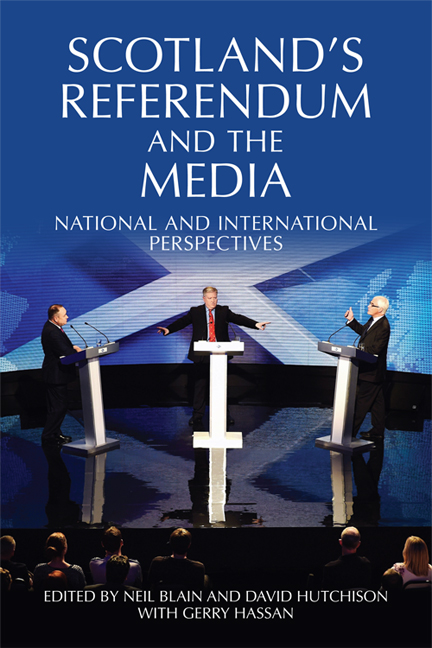Book contents
- Frontmatter
- Contents
- Preface
- Part One The Referendum in Scotland
- 1 The Unexpected Campaign
- 2 The Media Landscape in Scotland
- 3 Broadcasting and the Press: Some Key Moments
- 4 Scotland's Changing ‘Community of the Communicators’: The Political Commentariat and the Independence Referendum
- 5 The Scottish Press Account: Narratives of the Independence Referendum and its Aftermath
- 6 Scottish TV Coverage of the Referendum Campaign from September 2012 to September 2014
- 7 ‘Liked’, ‘Shared’, Re-tweeted: The Referendum Campaign on Social Media
- 8 Sport, Gender and National Identities
- Part Two Views from the UK
- Part Three International Perspectives
- Notes on the Contributors
- Index
4 - Scotland's Changing ‘Community of the Communicators’: The Political Commentariat and the Independence Referendum
from Part One - The Referendum in Scotland
Published online by Cambridge University Press: 05 August 2016
- Frontmatter
- Contents
- Preface
- Part One The Referendum in Scotland
- 1 The Unexpected Campaign
- 2 The Media Landscape in Scotland
- 3 Broadcasting and the Press: Some Key Moments
- 4 Scotland's Changing ‘Community of the Communicators’: The Political Commentariat and the Independence Referendum
- 5 The Scottish Press Account: Narratives of the Independence Referendum and its Aftermath
- 6 Scottish TV Coverage of the Referendum Campaign from September 2012 to September 2014
- 7 ‘Liked’, ‘Shared’, Re-tweeted: The Referendum Campaign on Social Media
- 8 Sport, Gender and National Identities
- Part Two Views from the UK
- Part Three International Perspectives
- Notes on the Contributors
- Index
Summary
Introduction
This chapter explores the characteristics, role and influence of the Scottish political commentariat. It develops previous research on this group into the terrain of the recent independence referendum debate.
A central concept in this research is the term ‘elite narratives’, used to give sense to a privileged and influential small group of participants in public life and the collective set of perspectives they deploy about contemporary Scotland. Mackenzie's concept of ‘the community of the communicators’ is also utilised, to place and understand the role of the commentariat in public life, the critical issue of who speaks and has authority, and who does not, issues of differential access and the marked gaps, and spaces and silences within public discourses.
The Making of the Commentariat
The concept of ‘the commentariat’ is of recent invention and importance. For example, it took Anthony Sampson, in his series Anatomy of Britain, the first of which was published in 1962, until the final update Who Runs This Place?, published in 2004, to use the term. Sampson presents a world where politics and public life have been remade by the media, and compares 1962 Britain with the present:
No sector increased its power in Britain more rapidly than the media. Editors, journalists and cameras penetrated nearly all institutions – including Parliament, the monarchy, the political parties and Whitehall – demanding answers to irrelevant questions, debunking their traditions and clamouring for openness. They were not separate limbs or membranes in the anatomy so much as part of the lifeblood, or nervous system.
This edition has a section on the ‘Commentariat’, with Sampson writing, ‘Many are now more famous than politicians, taken more seriously, better paid and more in demand as dinner guests’. He continues, ‘Many columnists are conscious of being intellectually superior to politicians with first-class degrees which in earlier times would have taken them into academia. They can be more candid than politicians bound by party discipline and discretion.’
Sampson identified the commentariat's characteristics: ‘Its members come from a more limited background than politicians: most were educated at Oxbridge, live in Islington and Kensington, and frequently attend media-political parties where they meet other communicators within the Westminster bubble.’
- Type
- Chapter
- Information
- Scotland's Referendum and the MediaNational and International Perspectives, pp. 33 - 45Publisher: Edinburgh University PressPrint publication year: 2016



